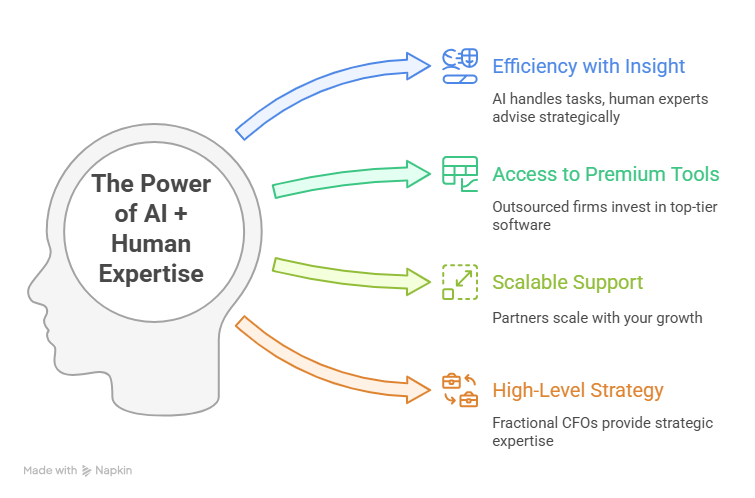Financial management has always been a cornerstone of startup success – especially as companies scale and expand globally. Traditionally, managing cash flow, maintaining compliance, and tracking finances across borders posed significant challenges. Today, artificial intelligence (AI) is changing the game.
For many startups, this transformation is already underway. ERB, a leader in outsourced CFO services for startups, is already integrating AI and automation to help clients manage their finances with agility and precision – from early-stage growth to international expansion.
In this article, we’ll explore how AI is revolutionizing financial operations and enabling startups to operate like mature enterprises without the overhead.
Why Startups Need AI in Finance
Startups operate with lean teams, limited resources, and high uncertainty. Yet they must manage payroll, cash flow, taxes, investor reporting, and compliance – all while growing quickly.

Here’s how AI changes that:
- Efficiency: AI automates time-consuming tasks like data entry, invoice processing, and reconciliations. Startups using AI can close monthly books up to 50% faster.
- Accuracy: AI minimizes costly human errors by handling transactions consistently and precisely.
- Cost Savings: Automating repetitive finance tasks reduces the need for extra staff or external consultants.
- Strategic Insights: AI transforms raw data into forecasts, trend analysis, and scenario planning, empowering smarter decision-making.

AI in Core Financial Operations
Bookkeeping & Data Entry
AI-powered tools like QuickBooks Online and Xero automatically categorize expenses, match transactions to invoices, and flag discrepancies. What once took hours now takes minutes – with greater accuracy.
Expense Management & Payroll
Apps like Expensify and Fyle use AI to scan receipts and input data. For global teams, AI-driven payroll platforms automatically apply the correct tax and labor laws by country – making international compliance manageable.
Accounts Payable & Receivable
AI platforms like Vic.ai process vendor invoices, extract relevant data, match them to POs, and even trigger payment approvals. On the receivable side, AI helps optimize invoice timing and send automated reminders – improving cash flow.
Reporting & Compliance
Modern platforms offer AI-powered dashboards that provide real-time reporting, highlight budget anomalies, and ensure compliance with evolving standards. Tools like Trullion support revenue recognition and lease accounting rules, making compliance accessible even for non-accountants.
Real-Time Insights That Drive Smarter Decisions
Cash Flow Forecasting
AI analyzes historical cash movement and predicts future scenarios. For example, it can warn of a potential shortfall months in advance or simulate the impact of expanding into a new region. Startups can use this foresight to secure funding or adjust spending proactively.
Dynamic Budgeting & Planning
AI-enhanced FP&A tools like Vena or Planful combine internal data with external benchmarks to refine forecasts. They can identify subtle changes in marketing ROI or costs, guiding startups to reallocate budgets before issues escalate.
Conversational Business Intelligence
Modern tools let users ask financial questions in plain English (“What were our biggest expenses last month?”) and receive real-time visual reports. This democratizes access to financial insights across the company.
Predictive Risk Management
AI tools continuously monitor transactions to detect fraud, anomalies, or delayed payments. They can also analyze market trends and social sentiment to flag external risks. This early-warning capability helps startups stay ahead of potential disruptions.
Supporting Global Expansion with AI
As startups scale internationally, AI helps manage the complexity of cross-border finance:
Multi-Currency & Multi-Language Support
AI tools manage real-time currency conversions, optimize exchange timing, and support multi-language document handling – enabling centralized financial control without needing local staff in each market.
Local Compliance
AI tax engines stay current with regulatory changes across jurisdictions, applying rules to ensure accurate filings and reducing exposure to fines or compliance risks.
Consolidated Global Financials
AI tools consolidate data across regions, giving startups a unified view of sales, costs, and profitability by market. This visibility allows leaders to make targeted adjustments and expansion decisions with confidence.
24/7 Financial Operations
With AI-driven workflows, approvals and alerts continue around the clock. Whether it’s an urgent overseas payment or an employee query, AI enables a “follow-the-sun” finance function without requiring global staffing.
Leading AI Tools Powering Startup Finance
- AI Accounting Software
QuickBooks, Xero, and FreshBooks now include AI to automate categorization, reconciliation, and reporting. For scaling startups, tools like Sage Intacct and NetSuite offer AI for anomaly detection and forecasting.
- Bookkeeping Automation
Platforms like Botkeeper and Booke AI manage bookkeeping via AI, while tools like Expensify handle receipt scanning and policy enforcement.
- Accounts Payable Automation
Vic.ai and similar tools read invoices, categorize expenses, and trigger approval flows — reducing workload and improving accuracy.
- AI FP&A Platforms
Tools like Datarails, Planful, and Anaplan use AI for scenario modeling and budget forecasting, giving startups a future-focused financial roadmap.
- Generative AI & Chatbots
AI assistants (e.g., Microsoft Copilot) help founders generate reports, summarize financials, and answer finance questions without needing deep expertise.
- Fraud & Risk Detection
Stripe Radar and Ocrolus use AI to spot payment fraud or document inconsistencies, enhancing security and internal controls.
The Power of AI + Human Expertise
While AI is a powerful enabler, it’s most effective when combined with experienced financial guidance. That’s where outsourced financial services come in – offering startups access to seasoned professionals who use AI to deliver deeper insights, faster.
Why Outsourcing Makes Sense
- Efficiency with Insight: AI handles the heavy lifting; human experts interpret the results and advise strategically.
- Access to Premium Tools: Top outsourced firms invest in best-in-class software, which would be costly for a single startup.
- Scalable Support: As you grow, your outsourced partner can scale with you – managing more volume, complexity, and regions.
- High-Level Strategy: Fractional CFOs bring context, judgment, and fundraising expertise – with AI-generated data at their fingertips.


Why ERB Is Leading the Way
When it comes to combining AI with human expertise, ERB stands out as a trusted partner for startups. With over 27 years of experience in outsourced CFO and financial services, ERB supports companies from launch to global expansion – with a deep understanding of startup challenges.
What sets ERB apart is its proactive use of AI-powered tools and automation to streamline processes, ensure compliance, and deliver strategic insights – all while offering a human, hands-on approach tailored to each client.
Whether you’re managing your first funding round or expanding to new markets, ERB gives you the tools, technology, and team to build a future-ready finance operation.
In a world where speed, accuracy, and agility define success, ERB helps startups scale smarter – powered by AI, guided by experience.
